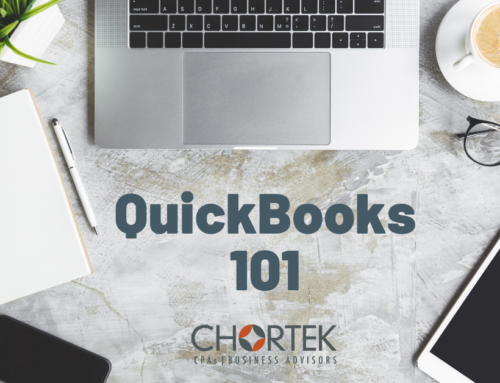What is the Difference Between QuickBooks Desktop Versions? Chortek’s In-Depth Look.
What is the difference between QuickBooks Desktop Pro and Premier? What about QuickBooks Enterprise? It may seem like we’re comparing apples to apples, but there are key differences you need to be thinking about. If you’re not sure which version of QuickBooks Desktop software is going to best fit your needs, you’re in the right place. We lay them all out in this blog so you can better determine what makes sense for your business.
QuickBooks Desktop Pro
User size and typical business revenue
QuickBooks Desktop Pro supports up to three simultaneous users. Each of these users needs to have their own QuickBooks end user license. A typical example of this would be where an owner (or two) and one bookkeeper would need to work in QuickBooks Pro. The business scenario that makes the most sense for this version is usually a company that has about $1 million in sales.
You may think you need something meatier than Desktop Pro if you have a larger operation for your company. However, depending on the business you run, this might not be the case. If you run a landscaping business, for example, where other employees might be out in the field, you don’t need all of those employees to have access to QuickBooks.
Desktop Pro can also be a good fit for your business if you don’t need any kind of specialization. It is the beginning platform and is not customized to any industry.
Features and tools of QuickBooks Desktop Pro
QuickBooks Pro and above can handle:
- Accounts Payable
- Accounts Receivable
- Estimates
- Comparing actual costs to estimated costs
- Job costing
- Inventory (average costing)
- Progress Invoicing
- Time and mileage
- 1099s (Misc. only) and 196s
- Price levels (based on a fixed percentage of the regular selling price for each price level)
- Integration with Microsoft Excel, Word and Outlook
- Multiple currencies
- Reconciliation of bank, credit card and other balance sheet accounts (recommend always saving the reconciliations outside of QuickBooks Pro as Pro only allows a one month look back to print)
- Sales taxes
- Budgets
- Form customization
- QuickBooks Messenger (chat between users)
- Payroll processing for an additional fee
So, what is the difference between QuickBooks Desktop Pro and Premier? Pro is a good place to start.
If you are just getting started and wanting to try out QuickBooks, Pro is a very cost-effective and manageable tool that introduces you to the basic needs of a business, like creating invoices and paying and tracking bills. The reconciliation process is user-friendly. Desktop Pro also has the basic necessary reports a business should review, including the Balance Sheet, Profit & Loss statement, Accounts Receivable Aging, and Accounts Payable Aging reports.
QuickBooks Desktop Pro can fit seamlessly into your outsourced accounting.
Even at the starting level, using QuickBooks with an external accountant is simple. When you need assistance from an outsourced accountant, you can easily send backup files or an Accountant’s Copy. If your accountant needs to send journal entry updates, they can do so via email and they can be reviewed and incorporated into your QuickBooks in just a few clicks. Any ProAdvisor would be able to train or assist you with any questions you may have. However, QuickBooks has made data transfer setup very easy.
It can also be great for your side hustle.
QuickBooks Desktop Pro can also be used for a hobby or side hustle. Say you make jams in your free time, and you want to track your costs to see if you’re coming out ahead. Or maybe, your side business is growing, but you can’t tell if you should keep putting time into it. QuickBooks Desktop Pro can organize all your information to confirm whether you are staying within the realms of a hobby, or if you need to start reporting the business on your personal tax return.
Conversely, all versions of QuickBooks Desktop work perfectly if you have more than one company.
On QuickBooks Desktop, you can have many companies within the same version and provide for your reporting needs. So, you can have your main company, but also have a separate file for your personal finances, and another file for your hobby, all within the same QuickBooks version. This is one thing that sets QuickBooks Desktop apart from QuickBooks online. QuickBooks Online requires a separate subscription for each company, with a monthly recurring payment. As long as you don’t need a payroll subscription (outsourced payroll) with QuickBooks Desktop, then you pay once for the version, and you don’t have any continued payments.
If what you’ve read sounds like it suits your needs, then QuickBooks Desktop Pro is a great option. However, if you’re still wondering, “What is the difference between QuickBooks Desktop Pro and Premier?”, for you, it may come down to whether you have an industry-specific need for special features. In this case, QuickBooks Desktop Premier is the next step up.
QuickBooks Desktop Premier
User size and typical business revenue
So, what’s the difference between QuickBooks Desktop Pro and Premier when it comes to users? Premier supports up to five simultaneous users. Again, it is typically good for companies with up to $1 million in sales that have roughly 20 employees. What sets Premier apart is that it has expanded capabilities related to inventory. Premier can create inventory assemblies, or bills of materials, sales orders to tack back orders, and purchase orders. Premier can also track the current availability of an item, and not just the quantity on hand.
Other advantages of QuickBooks Premier
With Premier, you also have:
- Units of measure, purchasing in one unit and selling in another
- The ability to create sales orders or purchase orders from estimates
- Per item price levels
- Billing rate levels
- The ability to view unbilled time and expenses from a table of data. (QuickBooks Pro allows you to view unbilled time and expenses only when you click on the Add Time/Costs button on an invoice.)
- The power to view or print past bank or credit card reconciliations (not just the most recently completed reconciliation period, such as the case in Pro)
- Balance Sheet by Class (some limitations apply)
- Exporting capability with report templates (to be imported into other QuickBooks company files. This makes customized reporting easier once the work has been done in one company file.)
- Forecasting and business planning (beyond budgeting)
- Reversing journal entries that are easy to create
QuickBooks Desktop Premier is great for businesses with industry-specific focuses.
QuickBooks Premier can also be purchased with an industry-specific focus. The list of industry editions are as follows:
- Contractor
- General Business
- Manufacturing & Wholesale
- Nonprofit
- Professional Services
- Retail
Each of these versions includes additional features specific to industry.
Regardless of industry, Premier should be your go-to if you need increased functionality.
QuickBooks Premier is both versatile and cost-effective. It allows for more functionality specific to all different business needs, and it can be purchased and kept for a long time. It also allows for more than one company file within the version.
One thing to keep in mind is that support from Intuit ends after three years. If you find you need further support or need additional features, you can purchase a “Plus” subscription for either Pro or Premier.
A Plus subscription includes:
- Hassle-free upgrades throughout the year
- Live 24/7 access to QuickBooks experts with QuickBooks Care
- Automatic online backup with Intuit Data Protect
- Data recovery service
- Available for multiple licenses
Should you pay for a Plus membership?
You may find a Plus membership to be useful, but if might not be necessary if you protect and backup your data using outside IT support. A QuickBooks expert can be nice, but a ProAdvisor through an accounting firm can also assist you when need, instead of paying for a subscription for constant support you may not need. Lastly, Upgrading QuickBooks depending on your business may or may not be necessary annually. If you need further guidance to decide, please contact your ProAdvisor or accountant to ensure you are making the most effective decision for your business.
If Premier does not suffice for your business, the next level would be QuickBooks Desktop Enterprise.
QuickBooks Desktop Enterprise
User size and typical business revenue
QuickBooks Desktop Enterprise is recommended for larger companies with sales greater than $1 million and 20 to 250 employees. It can support up to 30 simultaneous users. Because of this, it is the most robust edition of all QuickBooks offerings, including online versions.
Enterprise allows for the most transactions, multiple locations, and faster processing with larger limits. The reporting capabilities allow for combined reporting with multiple QuickBooks data files. Enterprise also has enhanced reporting capabilities, like additional user permissions and restrictions (View Only and Reports Only users, for example). This version allows for enhanced custom fields and the ability to change assembly components on the fly. Enterprise can also find items within reports and transactions based on item detail.
What we’re trying to say is that Enterprise has features galore.
Some other features of QuickBooks Desktop Enterprise include:
- Fixed Asset Manager
- Adjusting Journal Entries
- Closing Date Exception report
- QuickBooks Statement Writer (produces GAAP-compliant financial reports)
- Opening two companies at the same time
- Storing files on a Linux server
- Using Terminal Service for remote access
- Ability to be hosted in the cloud by subscription
Enterprise also comes in industry-specific editions which are the same as what we listed for Premier.
Enterprise subscription models
QuickBooks Enterprise is a subscription-based model. Instead of having one level, like plus, the three subscription plans are:
| Feature | Silver | Gold | Platinum |
|---|---|---|---|
| QuickBooks Enterprise | X | X | X |
| QuickBooks Priority Circle Program | X | X | X |
| U.S.-based Customer Support | X | X | X |
| Automatic online backup data storage | X | X | X |
| Automatic QuickBooks product upgrades | X | X | X |
| Advanced Reporting | X | X | X |
| QuickBooks Desktop Payroll Advanced | X | X | |
| Advanced Inventory | X | ||
| Advanced Pricing | X |
Details about some of the Enterprise subscription levels
Advanced Reporting provides some graphics along with the summary and detailed reports. It allows for more customization and filtering to enhance and identify trends and key performance insights more quickly.
Enhanced Payroll in Gold provides for the automatic calculation of payroll taxes for unlimited employees with no monthly fees. They easily track and pay payroll taxes and file the payroll tax forms.
Enterprise with Advanced Inventory Platinum level is the most robust inventory management that allows for multi-location inventory, serial number or lot tracking, FIFO inventory costing, bin location tracking, barcode scanning, mobile barcode receiving, mobile barcode picking, packing, and shipping.
Enterprise with Advanced Pricing with the Platinum subscription enables businesses to create sophisticated price rules including quantity discounts or seasonal discounts, manufacturer markdowns, and charge different prices by class or location. Overall Advanced Pricing can manage prices with a lot of flexibility and apply rules in various ways to reflect the potentially small price changes that can have a big impact on the company’s bottom line.
In closing, Enterprise is the most robust solution for your business needs.
QuickBooks Enterprise, along with the many add-on features, can provide the in-depth features and support for a complex business, whether small or large.
If you still have questions or a need not mentioned in this article, please reach out to our ProAdvisors at Chortek for more information.




